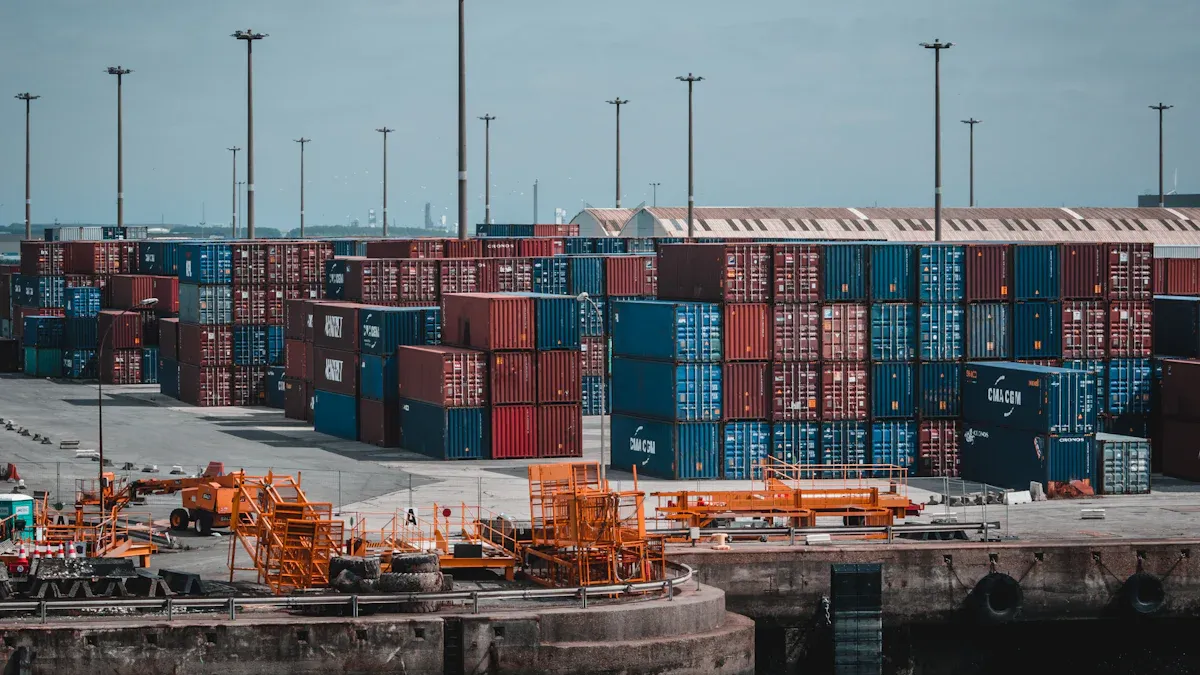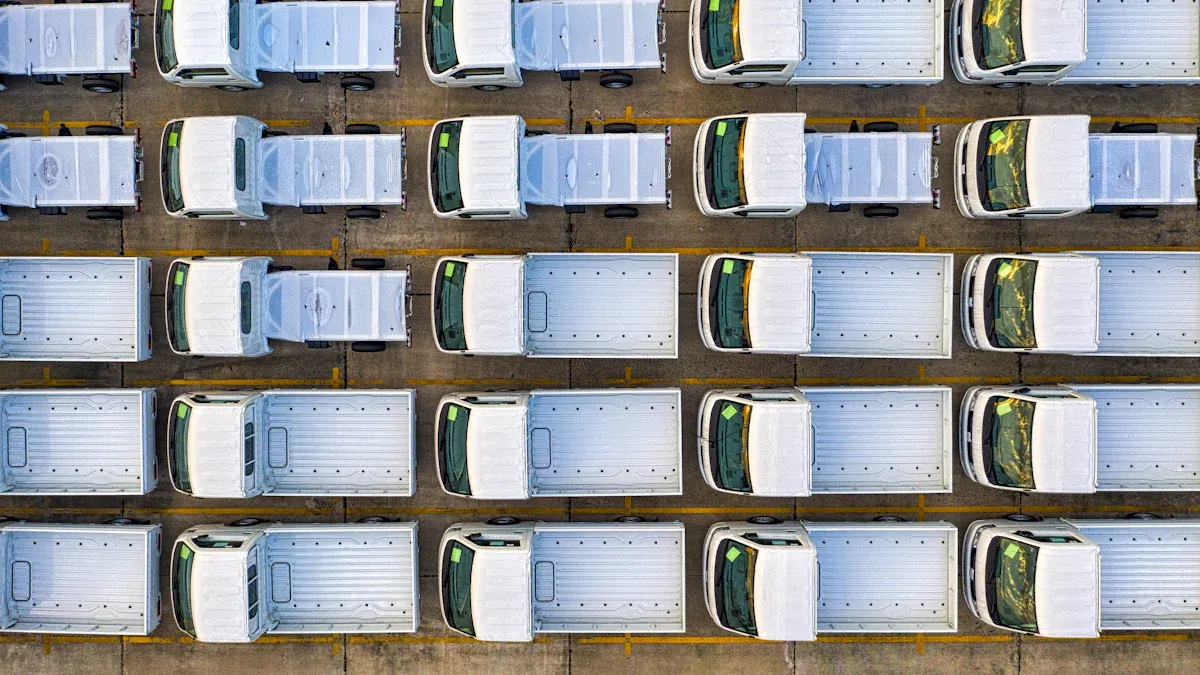Legal Insurance Requirements for Logistics Companies in 2025

You must follow strict logistics insurance requirements and policies to operate legally in 2025. Federal and state authorities set minimum liability coverage for different cargo types and vehicle classes. Review the table below to see the main coverage thresholds:
Coverage Type | Minimum Liability Coverage |
|---|---|
General freight (over 10,001 lbs) | $750,000 |
Hazardous materials | $1,000,000 – $5,000,000 |
Household goods | $300,000 |
Passenger carriers | $1,500,000 – $5,000,000 |
$1,500,000 |
You need commercial trucking insurance and must show proof before starting operations. Coverage limits depend on your vehicle size, cargo, and state rules. Stay aware of new mandates, since regulators update standards often.
Key Takeaways
Logistics companies must meet strict insurance requirements to operate legally in 2025. This includes minimum liability coverage based on cargo type and vehicle class.
Different types of insurance are mandatory for various logistics operations. Understand your business type to select the right coverage and comply with federal and state rules.
Always keep proof of insurance up to date. Regulators may request documentation at any time, so be prepared to show forms like BMC-91 or BMC-34.
Review contracts carefully for additional insurance requirements. Shippers and brokers may demand higher coverage limits than the law requires.
Stay informed about state-specific rules. Some states have higher insurance requirements than federal standards, so check local regulations regularly.
Logistics Insurance Requirements and Policies Overview

Mandatory Insurance Types in 2025
You must understand the different insurance types required for logistics companies in 2025. Federal and state rules set these requirements. The Federal Motor Carrier Safety Administration (FMCSA) and state agencies both play a role. Each business type in logistics faces unique risks, so you need specific coverage to match your operations.
Business Type | Purpose | |
|---|---|---|
Long-haul/interstate trucking | Excess liability, hazardous materials liability | Covers higher liability and hazardous materials compliance |
Last-mile delivery/courier services | Motor truck cargo, hired & non-owned auto coverage | Protects against package damage and covers rented or employee vehicles |
Passenger transport/bus/shuttle | Passenger liability, occupant medical coverage | Covers injury claims and medical costs for passengers |
Cold chain/refrigerated transport | Temperature damage/spoilage, product liability | Compensates for spoilage and equipment defects |
Hazardous materials transport | Pollution liability, environmental liability | Covers fines and cleanup for dangerous goods |
Local freight/regional trucking | Auto physical damage, inland marine insurance | Addresses wear and tear and covers goods in transit |
Logistics/freight brokerage | Errors & omissions, cyber liability | Protects against routing mistakes and cyber risks |
Warehousing + transportation combo | General liability, property & equipment coverage | Covers storage and transportation risks |
You must select the right policies for your business type. This helps you meet all logistics insurance requirements and policies for 2025.
Minimum Coverage Limits and Proof
You need to meet minimum coverage limits to operate legally. These limits depend on your cargo, vehicle, and state. Here are the typical minimums:
Commercial auto liability coverage: $750,000 to $5 million, based on cargo type.
General liability insurance: $1 million to $2 million per occurrence.
Cargo coverage: Required for logistics operations, with limits set by contract or regulation.
You must show proof of insurance to regulators. The FMCSA and state agencies accept specific forms as evidence:
Form | Purpose |
|---|---|
Shows coverage for bodily injury and property damage | |
BMC-34 | Proves financial responsibility for hazardous materials and environment |
Tip: Always keep your proof of insurance up to date. Regulators may ask for these forms at any time.
Why These Policies Are Required
You need these policies to follow the law and protect your business. Federal and state governments require insurance so you can cover costs if something goes wrong. Contracts with shippers or partners may also set higher limits or extra coverage.
Insurance helps you handle accidents, theft, and other risks in logistics.
It protects your company from big financial losses and keeps your business running.
Some contracts require higher liability limits, so you may need extra coverage.
You must follow logistics insurance requirements and policies to avoid fines, lawsuits, or losing your operating authority. The Road Haulage Association and other industry groups also set standards for coverage. By meeting these requirements, you show that your company is responsible and ready for the challenges of the logistics industry.
Key Insurance Types for Logistics Companies
Commercial Auto Liability
You need commercial auto liability insurance to protect your business from accidents on the road. This policy covers bodily injury and property damage you cause to others while driving for work. You also get coverage for legal defense costs. Most logistics companies choose coverage that includes physical damage, collision, and comprehensive protection for their trucks. Here is a quick look at common claims:
Coverage Type | Description |
|---|---|
Bodily Injury | Pays for medical bills and legal costs if someone gets hurt in an accident. |
Property Damage | Covers repairs or replacement for damaged vehicles or buildings. |
Tip: Make sure your policy meets the minimum limits set by federal and state rules. This helps you follow logistics insurance requirements and policies.
General Liability
General liability insurance protects you from risks that happen off the road. You need this coverage for accidents at loading docks, property damage, or advertising claims. Most contracts require at least $1 million per occurrence and $2 million aggregate. These limits help you handle claims that could hurt your business. Common exclusions include intentional acts, employee injuries, and accidents involving commercial vehicles. These exclusions make sure you have the right coverage for each risk.
Standard coverage limits:
$1 million per occurrence
$2 million aggregate
Note: General liability does not cover employee injuries or vehicle accidents. You need separate policies for those risks.
Motor Truck Cargo
Motor truck cargo insurance protects the goods you haul. If your cargo gets damaged or lost, this policy pays for repairs or replacement. You need this coverage to meet contract requirements and keep your customers happy. Coverage limits depend on the type of cargo and your business needs. Some policies also cover spoilage, theft, and temperature damage for refrigerated goods.
Workers’ Compensation
You must have workers’ compensation insurance if you hire employees. This policy pays for medical care and lost wages if your workers get hurt on the job. Every state requires this coverage as soon as you hire your first employee. Rates are higher for logistics companies because your workers face more risks, like vehicle accidents and lifting heavy items.
Workers’ compensation is mandatory for all employers with one or more employees.
Coverage starts when you hire your first worker.
Workers’ compensation helps you protect your team and follow state laws.
Compliance Steps and Documentation

FMCSA Filing and Portal Use
You must file the right insurance forms with the FMCSA before you can operate. Each form matches a specific business type and coverage need. The table below shows the main forms and their purposes:
Form | Who Needs It | Coverage | Minimum Coverage | Purpose |
|---|---|---|---|---|
BMC-91/BMC-91X | For-hire motor carriers | Bodily injury, property damage, environment | $750,000–$5,000,000 | Public Liability Insurance |
BMC-34/BMC-83 | Household goods motor carriers | Loss or damage to household goods | $5,000 per vehicle, $10,000/event | Cargo Insurance |
BMC-84/BMC-85 | Freight brokers and forwarders | Surety bond or trust fund | $75,000 minimum | Surety Bonds and Trust Funds |
BOC-3 | All carriers, brokers, forwarders | N/A | N/A | Designation of Process Agents |
MCS-90 | Hazardous materials carriers | Public liability coverage | N/A | Endorsement for Hazmat Carriers |
You use the FMCSA portal to submit these forms. The portal lets you file insurance documents electronically. You need a username and password to access the system. Only registered representatives can submit filings. The portal also helps you manage filings, print confirmation reports, and keep your records up to date.
State-Specific Compliance
States may set higher insurance requirements than federal rules. For example, Texas requires $1 million in liability for intrastate trucking, while the federal minimum is $750,000. Workers’ compensation laws also change by state. Some states need special permits for oversized loads, which may require extra insurance. Always check your state’s rules to make sure you meet all local requirements.
Tip: Review your state’s Department of Transportation website for the latest insurance rules.
Renewal, Audits, and Recordkeeping
You must keep your insurance documents current and ready for audits. During renewal or an audit, you may need to show:
Claims history for past incidents
Certificates of insurance as proof of active coverage
Payroll records for premium calculations
Tax forms for financial checks
Compliance documents to show you follow regulations
Keep accurate driver logs and records of vehicle maintenance. These records help prove you follow safety rules and protect you if there is an accident. Good recordkeeping also helps you avoid fines and keeps your business running smoothly.
Contractual and Additional Coverage Considerations
Contract-Driven Insurance Requirements
You often face insurance demands from shippers and brokers that go beyond legal minimums. These contract-driven requirements protect all parties involved in the supply chain. Many contracts require you to carry specific types of insurance with set coverage limits. Here are some common requirements you may encounter:
General liability insurance, usually with at least $1 million in coverage, protects against personal injury and property damage.
Workers' compensation insurance covers employee injuries and illnesses.
Errors and omissions insurance shields you from claims related to professional mistakes, such as incorrect delivery details.
Primary liability insurance, often set at $1 million, covers bodily injury and property damage in accidents.
Cargo insurance and contingent cargo insurance protect shipments and provide backup if a carrier’s insurance denies a claim.
Freight broker auto liability insurance and a freight broker bond (minimum $75,000) are required for brokers to operate legally.
Contract-driven insurance requirements can increase your costs. Higher coverage limits and open-ended liability clauses often lead to higher premiums and stricter underwriting. You must review each contract carefully to understand your obligations.
Umbrella, Cyber, and Environmental Policies
You may need extra insurance to cover risks not addressed by standard policies. Umbrella, cyber, and environmental insurance offer added protection. The table below shows their benefits and limitations:
Insurance Type | Benefits | Limitations |
|---|---|---|
Umbrella Insurance | Adds coverage above existing policies, protects assets | Does not cover professional errors or employee injuries |
Cyber Insurance | Protects against data breaches and cyber incidents | Some cyber risks need separate coverage |
Environmental Insurance | Covers pollution cleanup and hazardous material spills | May not cover all exposures without special endorsements |
Umbrella insurance helps you handle large claims. Cyber insurance addresses digital threats. Environmental insurance covers pollution and hazardous spills. You should check each policy for gaps and exclusions.
Common Compliance Pitfalls
You must avoid mistakes that can lead to penalties or denied claims. Many logistics companies struggle with compliance. The table below lists frequent pitfalls and their impact:
Compliance Pitfall | Description |
|---|---|
Inadequate Documentation | Missing or incomplete paperwork can delay or reject claims |
Delayed Notification | Waiting too long to report damage can result in claim denial |
Improper Packaging | Poor packaging may cause insurers to deny damage claims |
Failure to Mitigate Losses | Not acting to reduce losses after an incident can lower payouts |
Misunderstanding Policy Coverage | Not knowing what your policy covers can lead to surprises during claims |
Incorrect Valuation of Goods | Wrong values can cause disputes or insufficient compensation |
Failing to Conduct Proper Inspections | Not inspecting goods can make it hard to prove when damage occurred |
Lack of Communication | Poor communication with partners can slow down the claims process |
Overlooking Salvage Opportunities | Not salvaging damaged goods can increase losses and affect claims |
Tip: Keep your records organized, report incidents quickly, and review your policies often. Good habits help you avoid costly mistakes and keep your business running smoothly.
You must stay current with legal insurance requirements to protect your logistics business in 2025. Review your coverage, meet all federal and state rules, and keep your documents ready. Use this checklist:
Confirm minimum coverage for all policies
File required forms with FMCSA and your state
Keep proof of insurance updated
Regularly talk with insurance and legal experts. Proactive compliance helps you avoid fines and keeps your business running smoothly.
FAQ
What insurance do you need to start a logistics company in 2025?
You need commercial auto liability, general liability, motor truck cargo, and workers’ compensation insurance. You may also need extra coverage for hazardous materials or special contracts.
How do you prove you have the right insurance?
You show proof with forms like BMC-91 or BMC-34. Regulators and partners may ask for these at any time. Keep your documents updated and ready.
What happens if your insurance coverage lapses?
If your coverage lapses, you risk fines, loss of operating authority, and contract cancellations. Always renew your policies on time to avoid problems.
Do state rules differ from federal insurance requirements?
Yes, some states set higher limits or require extra coverage. Always check your state’s Department of Transportation website for the latest rules.
See Also
Enhancing Global Operations Through Innovative Logistics Solutions
PGL's Miami Warehousing Solutions Ensure Quick East Coast Deliveries
Key Strategies For Effective Global Logistics Management
PGL's Strategic Warehousing Hubs Optimize U.S. Supply Chains
Streamlining U.S. Supply Chains With Global Logistics Solutions
